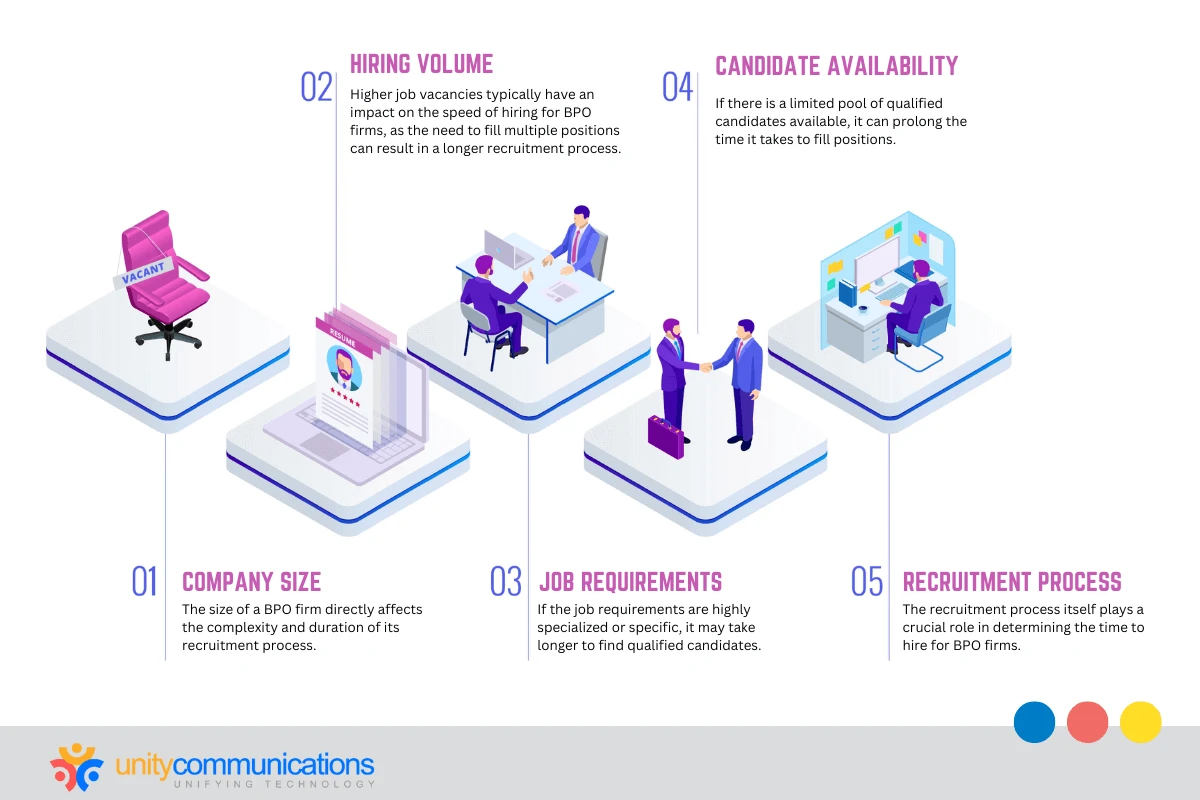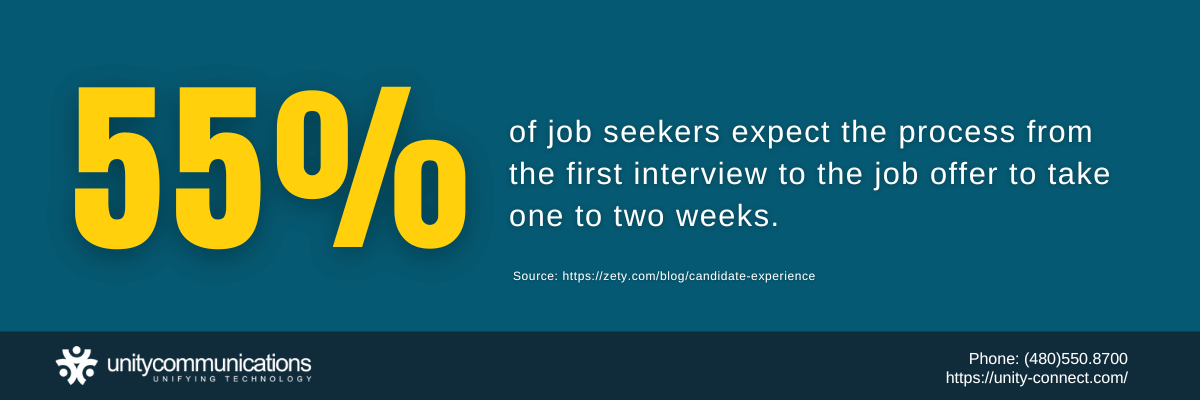Table of Contents
Hiring the best talent from a business process outsourcing (BPO) provider is quick and easy. But from a provider’s perspective, hunting for the right candidate is complex and time-consuming. The team suffers from slow productivity if it takes too long to fill a position.
Hence, understanding the average time to hire in the BPO industry helps set realistic timelines and improve the recruitment process. This capacity reduces the effort and resources spent on filling vacancies.
But how does the concept affect service vendors exactly?
Keep reading to learn more.
Exploring the Average Time To Hire in BPO

The duration encompassing a candidate’s initial job application to the final contract signing is encapsulated within the term “average time to hire.” This metric is a gauge for service providers to assess the timeline for receiving applications, conducting candidate screenings and interviews, negotiating employment terms, and ultimately formalizing the hiring process.
According to findings from a report by the Society for Human Resource Management (SHRM), the average recruitment process spans approximately 24 days. This figure provides insights into the expediency with which an ideal candidate can be identified and reflects the effectiveness of your recruitment team.
BPO firms ascertain this time-to-hire metric by calculating the number of days between the chosen applicant’s acceptance of the job offer and the day they initially submit their application. For example, if the candidate accepts the job offer on the 20th day and initiates the application process on the 5th day, the time to hire is computed as 15 days.
Time To Hire vs. Time To Fill
The terms “time to hire” and “time to fill” are frequently intertwined, leading to some confusion. It’s essential to clarify their distinctions:
- Time to Hire: This metric strictly gauges the duration from when a candidate submits their application until the contract is signed. It focuses solely on this pivotal phase of the recruitment process.
- Time to Fill: In contrast, time to fill encompasses the entire candidate journey, commencing from when a job posting is made public and extending through the new hire’s onboarding process. Service providers employ the average time to fill as a comprehensive measure to assess their overall recruitment efficiency. By analyzing time to fill, organizations can pinpoint any bottlenecks within their recruitment process and devise strategies to enhance the quality of their hiring practices.
Factors That Influence Time to Hire in BPO

Perhaps you are wondering why getting the average time to hire in BPO is crucial when you can get such data from time-to-fill measurements. The answer is simple: time to hire identifies which factors make the recruitment period longer.
Zety reports that 55% of job seekers expect the process from the first interview to the job offer to take one to two weeks. Service vendors thus need to revamp their application process if their current approach takes longer than that.
The factors listed below help hiring managers know which recruitment areas need improvement to reduce the time it takes to find and onboard the perfect candidate.
- Company Size: The larger a BPO firm is, the more complex and longer the recruitment process is. Therefore, providers need to plan well to ensure smooth and effective hiring.
- Hiring Volume: Higher job vacancies mean service providers should develop a more comprehensive strategy to speed up recruitment.
- Job Requirements: Roles requiring specialized skills and high tenure might need time extensions to hire the right people.
- Candidate Availability: Providers might struggle to recruit if only a few qualified candidates exist.
- Recruitment Process: A more rigorous process might take longer but can lead to a better-quality hire. Conversely, a less structured approach might be faster but yield poor results. Success still depends on how the BPO provider establishes and maintains its recruitment process.
- Location: Service providers based in areas with a limited talent pool should consider expanding their hiring to other regions, which lengthens their recruitment timeline.
How a Long Recruitment Process Affects BPO Companies

Knowing what offshoring, nearshoring, and onshoring are involves understanding how a lengthy recruitment process affects BPO companies. This way, you know which provider suits your needs best without wasting investment funds.
The following are the effects of delayed recruitment:
- Prolonged hiring leads to high costs for job ads, HR staff wages, and other relevant fees.
- A position remaining vacant for a long time decreases productivity and increases backlogs.
- BPO clients might get frustrated due to project delays caused by empty seats.
- Unfilled roles prevent providers from accepting new clients or projects.
- A slow recruitment process damages a provider’s reputation as an employer, urging top talent to seek opportunities elsewhere.
Ways To Improve the BPO Candidate Screening Process
Service providers follow practical steps to address the effects of a lengthy recruitment process. Note that a slow response time equals a negative customer experience. Likewise, companies that respond to candidates late might foster a bad impression. Hence, service providers ensure they meet the average time to hire in BPO through these best practices:
- Specify job requirements to quickly identify the most suitable applicants for the roles.
- Optimize advanced technologies to automate and accelerate candidate screening.
- Perform pre-screening interviews to assess a job seeker’s qualifications beforehand.
- Use psychometric assessments to predict an applicant’s potential and work performance more accurately.
- Add behavioral interviewing techniques to evaluate a candidate’s past behavior and performance in critical situations.
- Automate candidate background checking using artificial intelligence (AI) solutions.
How Do BPO Providers Attract and Retain Top Talent?

BPO companies combine competitive compensation, employee engagement programs, and BPO training or career development opportunities to attract and retain top talent. They also foster an inclusive work culture and promote work-life balance. Moreover, they motivate and recognize consistently excellent performance through incentives and promotions.
Why do these insights matter when exploring what BPO is?
A service provider’s strong talent retention strategy assures consistent, quality service delivery. The third-party staff’s brand familiarity guarantees a superior customer experience. Both clients and BPO contractors also benefit from cost reduction because high employee retention eliminates the need to continuously hire new workers.
The Bottom Line
The average time to hire in BPO is crucial to enhancing a service provider’s search for the best talent. Although it differs from time to fill, both recruiting metrics help providers plan their hiring strategies to meet staffing needs.
Considering the factors influencing this hiring process, BPO providers implement practical methods to enhance their candidate screening techniques. These practices also help address issues caused by the prolonged recruitment period. So expect high-quality support and output when outsourcing to a reliable service provider.
Do you want to work with a BPO company with a stable recruitment approach to meet your HR needs? Let’s connect; Unity Communications executes a fast, cost-effective process to hire suitable candidates and meet your desired outcomes. The award-winning provider also strategically retains its talent to support your continued success.



